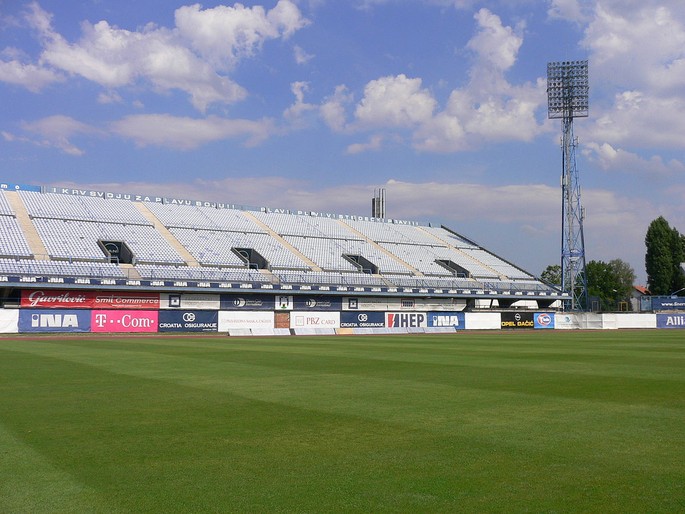 Everyone that watches football or is in anyway associated with the sport would almost certainly say that the Champions League is the pinnacle of club football in Europe. The best of the best take each other on, firstly in a series of group stage matches before the tournament moves on to a knockout phase. Whilst it is certainly the case that the top teams on the continent are involved in the competition that used to be known as the European Cup, the manner in which countries are selected to send teams means that not all participants are equal.
Everyone that watches football or is in anyway associated with the sport would almost certainly say that the Champions League is the pinnacle of club football in Europe. The best of the best take each other on, firstly in a series of group stage matches before the tournament moves on to a knockout phase. Whilst it is certainly the case that the top teams on the continent are involved in the competition that used to be known as the European Cup, the manner in which countries are selected to send teams means that not all participants are equal.
The UEFA co-efficient is used to decide how many teams each European country gets to send to take part in the Champions League, with the top countries usually getting several berths straight into the group stages. The lesser countries will often only get spaces in the qualifiers, meaning that sides have to qualify to take part in the competition proper. As a result, most of the weaker teams are weeded out before the group stage even gets underway, but every now and then a team that isn’t as strong as the best of the best makes it through.
Qualification Explained

There are 55 countries that are governed by UEFA. In the days when the top competition was known as the European Champion Clubs’ Cup, the top team from the major countries was the only one that would make it to the final stage of the tournament. That changed when the competition was re-branded as the Champions League in 1992, since when a number of places were given over to the second, third and fourth-placed teams in certain countries. Ironically, it stopped being a tournament for ‘champions’ at the point that it took on that moniker.
UEFA Co-Efficient
Nowadays, the number of places that a country gets in the Champions League is dictated by its UEFA co-efficient. This is calculated using a weighted arithmetic, with the result seeing the number of teams that will compete the season after the one following its release. In other words, rankings released at the conclusion of the 2021-2022 campaign will determine how many teams each country will have playing in the competition in the 2023-2024 season. The obvious question then becomes about how the co-efficient is actually determined.
In short, the performance of the clubs taking part in the Champions League, the Europa League and the UEFA Europa Conference over the previous five seasons are used. A win is awarded two points, a draw one, with qualifiers seeing those points cut in half. Qualification for later rounds receives four points, with the number of points achieved each season divided by the number of teams that took part in that year’s competition. After that, the number is rounded down to three decimal places. Bonus points are awarded for the following achievements by clubs:
- Group Stage: 4 Bonus Points
- Group Winners: 4 Bonus Points in Europa League, 2 Bonus Points in Europa Conference League
- Group Runners-Up: 2 Bonus Points in Europa League, 1 Bonus Point Europa Conference League
- Reach Round of 16: 5 Bonus Points in Champions League, 1 Bonus Point in Europa League
- Reach Quarter-Finals: 1 Bonus Point for Champions League and Europa League
- Reach Semi-Final or Final: 1 Bonus Point in all three tournaments
The higher a nation’s co-efficient, the more teams that country is able to enter into the Champions League and the later in the competition they will come in. No teams enter later than the knockout stage, but there is a six-round qualifying tournament that is used to decide upon four of six qualifiers. They are competed over by the 43 to 44 national champions of countries with low UEFA coefficients. The two remaining places go to the winners of a three-round qualifying tournament that is only open to the countries that are ranked five to 15 and have qualified by finishing either second or third in their leagues.
The Worst Group Stage Teams
To put all of the above in another way, there are a large number of teams that never even make it to the Champions League proper, which is considered to be from the group stage onwards. It is reasonable to surmise that these teams are ‘worse’ than the teams that make it through to the group stage of the competition. We are therefore only looking at the teams that made it to the groups but then failed to impress during their spell in Europe’s premier competition. As you’ll see, there have been some pretty poor teams over the years.
Dynamo Zagreb 2016-17
| Home | Score | Away |
|---|---|---|
| Lyon | 3-0 | Dynamo Zagreb |
| Dynamo Zagreb | 0-4 | Juventus |
| Dynamo Zagreb | 0-1 | Sevilla |
| Sevilla | 4-0 | Dynamo Zagreb |
| Dynamo Zagreb | 0-1 | Lyon |
| Juventus | 2-0 | Dynamo Zagreb |
Croatian side Dinamo Zagreb made it into the 2016-2017 Champions League thanks to the fact that the club won the PRVA HNL, the Croatian First Division, the previous season. They also won that season’s Croatian Cup, so hopes were high going into the new campaign that they’d be able to do something, which was furthered when they defeated Vardar from North Macedonia, Georgian team Dinamo Tbilisi and Austria’s Red Bull Salzburg in the qualifying rounds for the Champions League, but the draw didn’t do them any favours.
Put in a group with Italy’s Juventus, Spanish side Sevilla and Lyon from France, Zagreb failed to score a single goal in the group stage. On top of that, they conceded 15 on their way to losing all six matches, meaning that they ended up without a single point on the board and a goal difference of -15. The closest that they came to getting anything came in their home match against Sevilla, when just over 6,000 people turned up to the Stadion Maksimir to watch them lose 1-0 against the Spanish side, losing by the same score in the home game against Lyon.
Maccabi Haifa 2009-10
| Home | Score | Away |
|---|---|---|
| Maccabi Haifa | 0-3 | Bayern Munich |
| Bordeaux | 1-0 | Maccabi Haifa |
| Juventus | 1-0 | Maccabi Haifa |
| Maccabi Haifa | 0-1 | Juventus |
| Bayern Munich | 1-0 | Maccabi Haifa |
| Maccabi Haifa | 0-1 | Bordeaux |
When Maccabi Haifa defeated Maccabi Netanya on the 23rd of May 2009, they won the Israeli Premier League and earned a place in the second qualifying round of the Champions League for the following season. They were drawn to play Northern Irish side Glentoran, who they defeated 6-0 in the first-leg and 4-0 in the second-leg for an aggregate score of 10-0. That saw them make it through to the champions path of qualification, with Aktobe from Kazakhstan the team that they needed to get past.
The two sides were evenly matched, drawing the first-leg 0-0 before Maccabi Haifa ran out 4-3 winners of the second-leg. That put them into the play-off, where they were drawn to play Red Bull Salzburg, who they defeated 2-1 in the first-leg and 3-0 in the second. Sadly, the success for the Israeli side ended there, drawn as they were into a group with French side Bordeaux, Germany’s Bayern Munich and Italian team Juventus.
As you can see, there was no point at which the Israeli side were completely humiliated, making a good account of themselves by only losing by a single goal in all but one of the games. Even so, they finished their group stage campaign with zero wins, zero goals scored and a goal difference of -8. They were actually the first team ever to end the group stage of the tournament with a zero in the wins, goals and points column, which was obviously rather embarrassing all on its own.
Deportivo La Coruña 2004-05
| Home | Score | Away |
|---|---|---|
| Deportivo | 0-0 | Olympiacos |
| Monaco | 2-1 | Deportivo |
| Liverpool | 0-0 | Deportivo |
| Deportivo | 0-1 | Liverpool |
| Olympiacos | 1-0 | Deportivo |
| Deportivo | 0-5 | Monaco |
Whilst the 2004-2005 Champions League campaign would go down in history as being one of the most exciting ever thanks to the thrilling final between Liverpool and AC Milan, things were rather more disappointing for Deportivo La Coruña. As with the Merseyside club, Deportivo actually entered in the third qualifying round, being drawn against Irish team Shelbourne. The two sides drew the first-leg 0-0 before the Spanish team cruised to a 3-0 win in the second-leg, putting them into the group stage, where they were drawn against the eventual winners.
Also in the group with Liverpool and Deportivo La Coruña were Olympiakos and Monaco. The French side topped the group, whilst the Greek side managed to qualify for what was then still known as the UEFA Cup. Unlike the other two teams on this list, Deportivo did at least manage to get some points on the board, even if they mirrored the others in failing to score a single goal.
No one could have guessed at the end of the group stage of that season’s Champions League that the eventual winners would come from Group A, but that’s exactly what happened when Liverpool came back from 3-0 down to defeat AC Milan in the final. Whilst Deportivo La Coruña only managed to get two points and didn’t score any goals, they did get one of those points from Liverpool, putting them ahead of both Dinamo Zagreb and Maccabi Haifa in terms of the overall performance.
The Zero Points Brigade

Dynamo Zagreb’s Maksimir Stadium by Dinamostar, Wikimedia Commons
The above sides are the ones that left the Champions League without scoring a single goal. Whether scoring goals but failing to get any points is better or worse than not even scoring is a matter for some debate, but the competitive nature of the Champions League is such that the strength of the group is perhaps the deciding factor. Even so, here’s a look at all of the teams that failed to get any points in the group stage, complete with the season that their questionable accomplishment occurred:
Champion League Teams with Zero Group Stage Points
| Season | Team | Goal Diff. |
|---|---|---|
| 1997-1998 | Košice | -11 |
| 2001-2002 | Fenerbahçe | -9 |
| 2002-2003 | Spartak Moscow | -17 |
| 2004-2005 | Anderlecht | -13 |
| 2005-2006 | Rapid Wien | -12 |
| 2006-2007 | Levski Sofia | -16 |
| 2007-2008 | Dynamo Kyiv | -15 |
| 2009-2010 | Maccabi Haifa | -8 |
| 2009-2010 | Debrecen | -14 |
| 2010-2011 | Žilina | -16 |
| 2010-2011 | FK Partizan | -11 |
| 2011-2012 | Oțelul Galați | -8 |
| 2011-2012 | Villarreal | -12 |
| 2011-2012 | Dinamo Zagreb | -19 |
| 2013-2014 | Marseille | -9 |
| 2015-2016 | Maccabi Tel Aviv | -15 |
| 2016-2017 | Club Brugge | -12 |
| 2016-2017 | Dinamo Zagreb | -15 |
| 2017-2018 | Benfica | -13 |
| 2018-2019 | AEK Athens | -11 |
| 2021-2022 | Beşiktaş | -16 |
The fact that Dinamo Zagreb feature on this list twice is probably an indication that the Croatian side might definitively be the worst side in Champions League history. The 2011-2012 season might be considered better than the 2016-2017 campaign, on account of the fact that they actually scored three goals, but the fact that they conceded 22 maybe takes away any credit. That 2011-2012 season is arguably the worst that the Champions League has seen, given the fact that three of the participating teams failed to earn a point.
